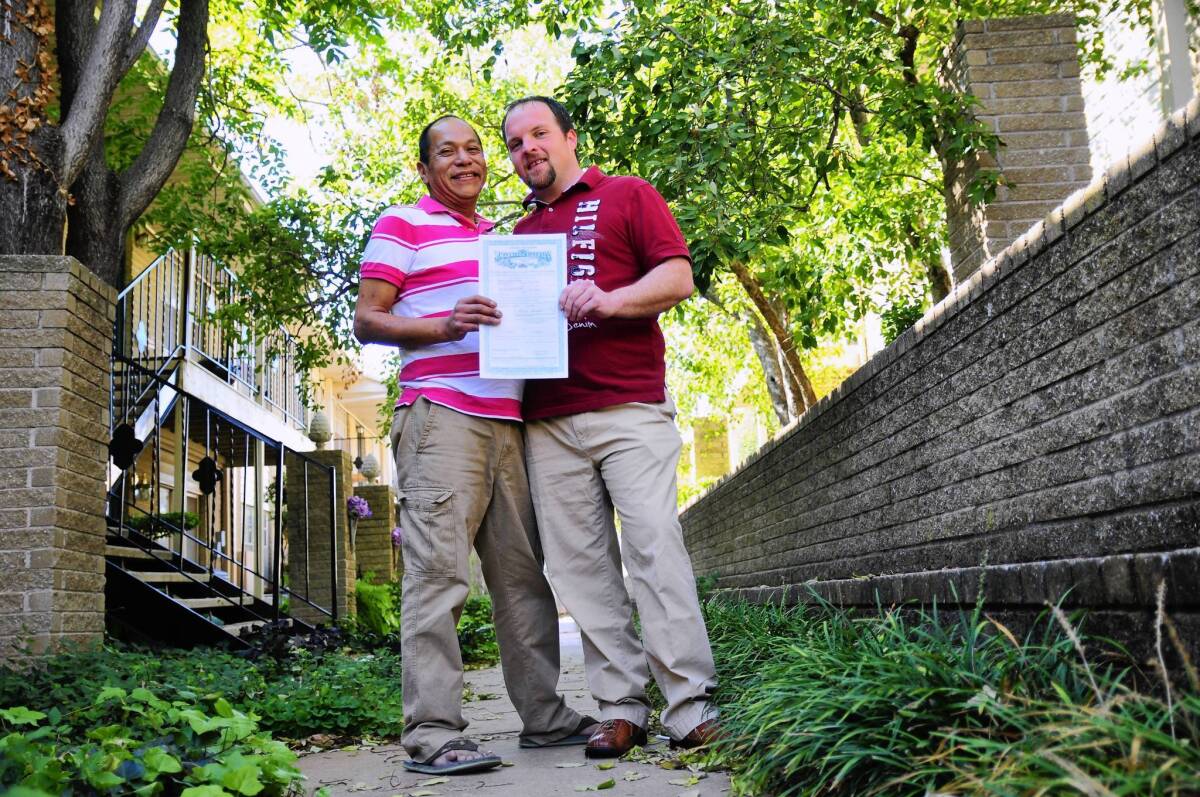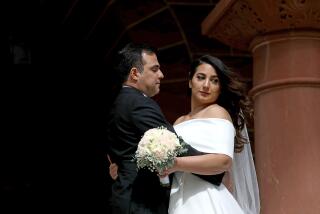Oklahoma couple draw attention with tribal gay marriage

CONCHO, Okla. — Darren Black Bear and Jason Pickel hadn’t even planned to send invitations to their upcoming wedding.
They’re small-town people, they said, and planned an intimate, no-frills celebration of their love.
“I intended to tell people, ‘Hey, we’re getting married. Come on down and have dinner,’” Pickel said, laughing. Then, during an interview in his Oklahoma City apartment, his cellphone vibrated: yet another media request. And then came another.
Since word about their upcoming nuptials spread, Pickel and Black Bear have been thrust into the spotlight over one of the most hot-button issues in this state. Gay marriage is banned in Oklahoma, but the men will marry legally under Native American tribal jurisdiction.
Black Bear is a member of the Cheyenne and Arapaho Tribes, based in rural Concho. The joint tribe does not specify gender in its laws regarding marriage, referring to those involved only as “Indians.” Because the tribe is a federally recognized sovereign nation, the state’s ban does not apply.
Black Bear and Pickel, who is not a tribal member, will be eligible for federal benefits made available to married same-sex couples after the Supreme Court struck down part of the Defense of Marriage Act.
Under state law, however, “tribal same-sex weddings are treated the same way as out-of-state same-sex weddings,” Alex Weintz, a spokesman for Republican Gov. Mary Fallin, said in an email. “They are not recognized by the state of Oklahoma.”
In 2004, Oklahomans voted overwhelmingly — 75% to 25% — to approve a constitutional amendment defining marriage as between a man and a woman and making it a misdemeanor to issue a marriage license to a same-sex couple.
Black Bear, 45, and Pickel, 36, had originally planned to travel to Iowa this fall to get married. They have been a couple for nearly nine years and have “been through all the trials” and “have always stuck together,” Black Bear said.
Planning a trip to Iowa, however, proved difficult with their busy schedules. Black Bear works as a floral supervisor in Oklahoma City, and Pickel is working on an undergraduate degree in mortuary science while doing a funeral home apprenticeship.
Pickel decided to call his tribe about a marriage license, even though he expected to be turned down.
A clerk told them all they needed was $20 and a few forms of identification. They got their license in Concho on Oct. 18, said Pickel, who will change his last name to Black Bear.
They hadn’t planned to publicize their engagement. They mentioned it on Facebook, and word spread further when tribal and mainstream newspapers wrote about the couple.
Last week they were still unpacking boxes in their new Oklahoma City apartment a few weeks after their old apartment building burned in a fire. Pickel said their new neighbors are probably wondering why news trucks have been parked outside.
The upcoming marriage has focused attention on the Cheyenne and Arapaho tribe, which has about 12,000 members. The tribe has quietly married two other gay couples since December, said Lisa Liebl, a spokeswoman.
Not all tribes allow gay marriage. Some, such as the Osage Nation and the Cherokee Nation, have laws banning same-sex marriage.
On Friday, about three dozen tribal members attended a hastily called meeting in the Cheyenne and Arapaho Tribal Administration Center in Concho.
Ida Hoffman, the tribe’s chief of staff, called the meeting to make a personal statement against the marriages. Pickel sat in the front row, wearing a small rainbow-colored ribbon on his chest.
“These men are receiving their 15 minutes of fame to the detriment of the Cheyenne and Arapaho Tribes as a sovereign nation,” Hoffman said.
The tribe should get the chance to vote on the issue, Hoffman said, adding, “My plan is to make sure it is prohibited in the future.”
In an impassioned and sometimes tearful response to Hoffman’s statements, Frances Wise, 28, said she was a proud member of the gay community. Native people have long accepted gay people, who were called “two-spirited people,” she said. That respect shouldn’t change because they wanted their relationships validated by marriage, Wise said.
“Hating someone because they have a different sexual preference is like hating someone because they have brown eyes or because they have brown skin,” she said. “That’s something they can’t help.”
Pickel said he and Black Bear did not intend to “bring any negative light to the tribe” and that they had received love and support from tribal members.
Ramona Tall Bear, a legislative clerk for the tribe, said she thought the issue of marriage should go to a vote by tribal members because it dealt with a legal code. But the tribe has always been accepting of gay people, she said.
“My mother always said to treat them with more respect because their lives are so hard,” Tall Bear said.
Hiram Prairie Chief and his husband, Fritz Prairie Chief, sat quietly in the back of the room during the meeting. They were the first gay couple to be issued a marriage license by the tribe and were married in a small ceremony in December.
Hiram Prairie Chief says they are involved with the tribe and serve on powwow committees. They have never received negative comments about their marriage, he said.
“We don’t hide it,” he said.
Pickel and Black Bear plan to get married Thursday on tribal land. They will wear khaki pants and black shirts, and they are writing their own vows. Black Bear’s father, the Rev. Floyd Black Bear, a former tribal council member, will officiate.
They ended up sending more than 100 invitations, including one to Fallin. The governor, they said, politely declined.
More to Read
Start your day right
Sign up for Essential California for news, features and recommendations from the L.A. Times and beyond in your inbox six days a week.
You may occasionally receive promotional content from the Los Angeles Times.







